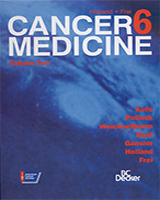By agreement with the publisher, this book is accessible by the search feature, but cannot be browsed.
NCBI Bookshelf. A service of the National Library of Medicine, National Institutes of Health.
Kufe DW, Pollock RE, Weichselbaum RR, et al., editors. Holland-Frei Cancer Medicine. 6th edition. Hamilton (ON): BC Decker; 2003.

Holland-Frei Cancer Medicine. 6th edition.
Show detailsMacrophage colony-stimulating factor (M-CSF) is a bone marrow-derived glycoprotein that is capable of supporting the proliferation, maturation, and activation of cells of the mononuclear phagocyte lineage,150,151 and that has been approved for therapy in Japan. M-CSF binds to a specific, high-affinity tissue receptor that is expressed on monocytes and macrophages and is encoded by the c-fms oncogene.152 M-CSF-activated monocytes and macrophages have enhanced in vitro tumoricidal as well as antimicrobial activity which form the basis of the interest in this agent for both its potential anticancer and antiinfectious properties.153–156 M-CSF has antitumor activity in preclinical studies, with reduced number of metastases and prolonged survival noted in B16 melanoma, although apparently greater activity was observed when the cytokine was used in therapy with an antitumor monoclonal antibody.157,158 G-CSF and GM-CSF are stimulating factors for the cells in their names, with G-CSF showing efficacy and GM-CSF showing broader functional activity in early trials; a comparative analysis of these CSFs was recently reported.159
Significant biologic and clinical effects have been observed with two different recombinant M-CSFs, as well as with a urine-derived human M-CSF studied in Japan, with relatively little toxicity.129,160–163 Dose- and schedule-dependent monocytosis were observed and associated with reciprocal changes in the peripheral blood platelet count.160 Decreases in serum cholesterol and low-density lipoproteins, similar to observations made in preclinical studies, also were observed, as well as clinical responses in patients with melanoma, renal cell carcinoma, and leiomyosarcoma. Potential uses for the various CSFs in clinical oncology include administration with monoclonal antitumor antibodies or other cytokines in cancer therapy, or following bone marrow transplantation, where monocyte-activating properties might be useful for both antitumor and antifungal effects.164,165
- Colony-Stimulating Factors - Holland-Frei Cancer MedicineColony-Stimulating Factors - Holland-Frei Cancer Medicine
Your browsing activity is empty.
Activity recording is turned off.
See more...